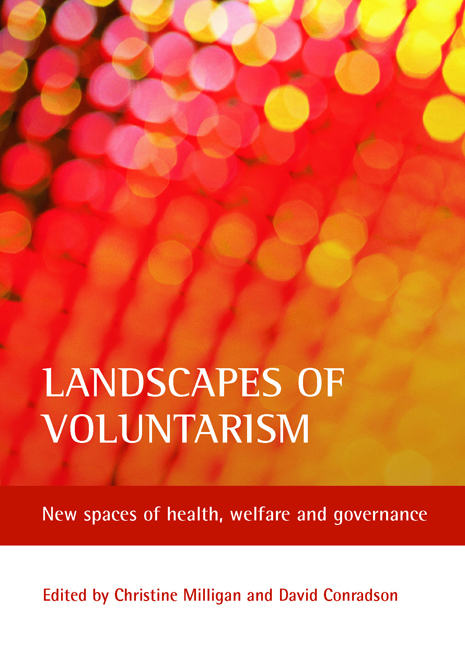Book contents
- Frontmatter
- Contents
- List of tables, figures, maps and plates
- Notes on contributors
- Foreword: Beyond the shadow state?
- one Contemporary landscapes of welfare: the ‘voluntary turn’?
- two A ‘new institutional fix’? The ‘community turn’ and the changing role of the voluntary sector
- three Renewal or relocation? Social welfare, voluntarism and the city
- four Voluntarism and new forms of governance in rural communities
- five New times, new relationships: mental health, primary care and public health in New Zealand
- six Informal and voluntary care in Canada: caught in the Act?
- seven Competition, adaptation and resistance: (re)forming health organisations in New Zealand’s third sector
- eight The difference of voluntarism: the place of voluntary sector care homes for older Jewish people in the United Kingdom
- nine Values, practices and strategic divestment: Christian social service organisations in New Zealand
- ten Faith-based organisations and welfare provision in Northern Ireland and North America: whose agenda?
- eleven Government restructuring and settlement agencies in Vancouver: bringing advocacy back in
- twelve Developing voluntary community spaces and Ethnicity in Sydney, Australia
- thirteen The voluntary spaces of charity shops: workplaces or domestic spaces?
- fourteen The changing landscape of voluntary sector counselling in Scotland
- fifteen Volunteering, geography and welfare: a multilevel investigation of geographical variations in voluntary action
- sixteen Reflections on landscapes of voluntarism
- Index
ten - Faith-based organisations and welfare provision in Northern Irelandand North America: whose agenda?
Published online by Cambridge University Press: 15 January 2022
- Frontmatter
- Contents
- List of tables, figures, maps and plates
- Notes on contributors
- Foreword: Beyond the shadow state?
- one Contemporary landscapes of welfare: the ‘voluntary turn’?
- two A ‘new institutional fix’? The ‘community turn’ and the changing role of the voluntary sector
- three Renewal or relocation? Social welfare, voluntarism and the city
- four Voluntarism and new forms of governance in rural communities
- five New times, new relationships: mental health, primary care and public health in New Zealand
- six Informal and voluntary care in Canada: caught in the Act?
- seven Competition, adaptation and resistance: (re)forming health organisations in New Zealand’s third sector
- eight The difference of voluntarism: the place of voluntary sector care homes for older Jewish people in the United Kingdom
- nine Values, practices and strategic divestment: Christian social service organisations in New Zealand
- ten Faith-based organisations and welfare provision in Northern Ireland and North America: whose agenda?
- eleven Government restructuring and settlement agencies in Vancouver: bringing advocacy back in
- twelve Developing voluntary community spaces and Ethnicity in Sydney, Australia
- thirteen The voluntary spaces of charity shops: workplaces or domestic spaces?
- fourteen The changing landscape of voluntary sector counselling in Scotland
- fifteen Volunteering, geography and welfare: a multilevel investigation of geographical variations in voluntary action
- sixteen Reflections on landscapes of voluntarism
- Index
Summary
Introduction
This chapter draws on research evidence from two national contexts that, although distinctly different, are selected because they show signs not only of a similar apparent convergence between government aspirations and some of the purposes of faith communities but also of attempts to harness the resources of such communities to policy aims. That there should be government interest in faith communities is unsurprising, given that the most cursory survey of a landscape of voluntarism reveals religion at the heart of much voluntary action ‘providing the initial and continuing impetus for activities ranging from small-scale parish-based social and health services to major international emergency relief and development efforts’ (Kendall and Knapp, 1996, p 1). Thus one of the debates within the non-profit or voluntary sector that currently engages policy makers in the US and, perhaps in a more low key way, in the UK, centres on moves to encourage greater involvement of faith-based organisations1 in a range of community-benefit programmes through initiatives to broaden the access of these organisations to government support.
A growing body of empirical studies into the strengths and weaknesses of faith-based voluntary action now informs this debate on both sides of the Atlantic (Harris, 1994, 1995; Wineburg, 1994; Cameron, 1998; Cnaan, 2000; Sherman, 2000). In the US a White House Office of Faith-based and Community Initiatives (OFBCI), set up in February 2001, pursues a policy that includes: adjusting the law to allow faith-based and community organisations to compete for federal funding; eliminating barriers to such organisations being included in the provision of social services; and encouraging greater corporate and philanthropic support for faith-based and community organisations through public education and outreach activities. In the UK a Faith Communities Unit (FCU), formed at the Home Office in June 2003, is evidence of a similar trend and also marks a significant step towards involving representatives of the major world faiths found in Britain in policy development. There is perhaps a more oblique approach to faith groups by the UK government, focusing less on their potential for direct service provision than on activities that strengthen social cohesion or that sustain and renew local communities.
- Type
- Chapter
- Information
- Landscapes of VoluntarismNew Spaces of Health, Welfare and Governance, pp. 173 - 190Publisher: Bristol University PressPrint publication year: 2006



